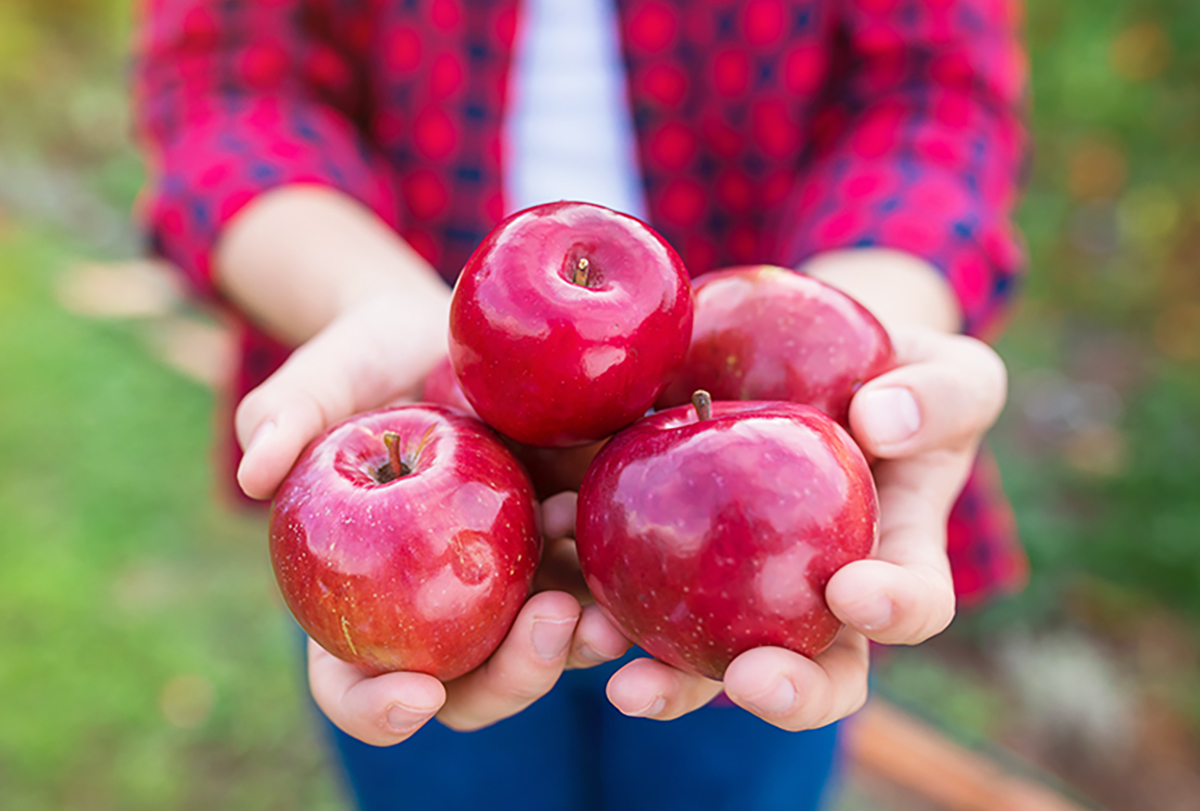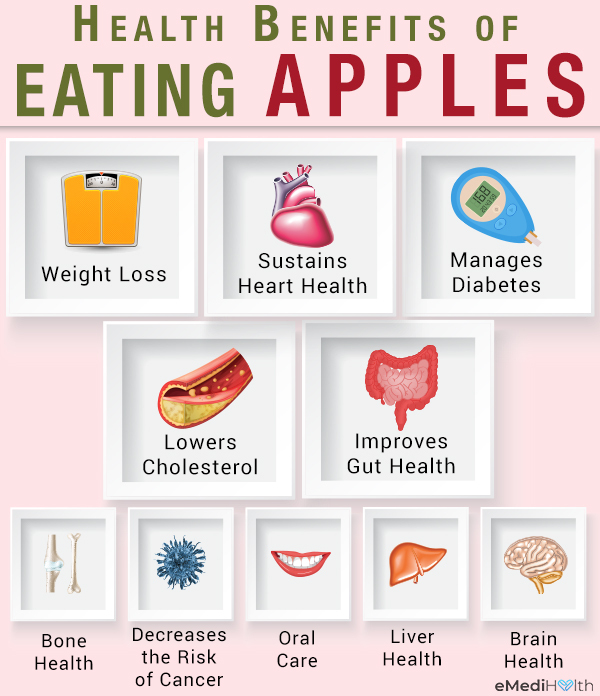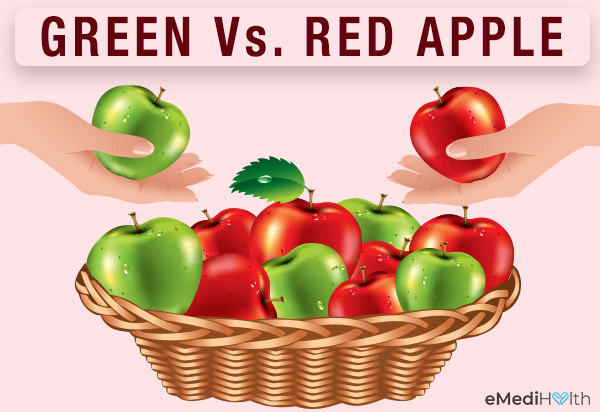In this article:
Malus domestica is a giant flowering plant from the Rosaceae family that produces a bright-colored (commonly red), sweet, and delicious fruit known as an apple. About 7,500 different varieties of apples are cultivated all around the world.

In the United States, the apple is the most commonly eaten fruit after bananas. Almost 65% of the apples produced in the United States are eaten raw and the rest is processed into products. (1)
Nutritional Value of Apples
Apples have high water content, which accounts for almost 85% of its composition. They contain 13% carbohydrates.
Apples are also loaded with nutrients, including vitamins (C and B complex), plant compounds, calcium, potassium, and phosphorus, each of which has its own health merits. Apples contain plenty of dietary fiber. One kg (2.2 lbs) of fresh apples may provide about 500 kcal of energy.
Every 100 g portion of raw apple with skin contains the following: (2)
- Water – 85.56 g
- Energy – 52 kcal
- Protein – 0.26 g
- Total lipid – 0.17 g
- Potassium – 107 g
- Fiber – 2.4 g
- Vitamin C – 4.6 mg
Different Varieties of Apple
The following are well-known varieties of apples that are commonly used for baking and cooking:
- Honeycrisp
- Melrose
- Braeburn
- Crispin
- Golden Delicious
If you want to enjoy the sweet, juicy goodness of the raw apples, try the following varieties:
- Red Delicious
- Gala
- Fuji
- McIntosh
- Jonagold
Benefits of Eating Apples

Apples are bestowed with a refreshing taste and numerous health benefits.
1. Aid weight loss
Apples are rich sources of fiber, which prevents overeating and untimely snacking. Also, it is low in calories, so they are great for keeping your weight under control. (1)(3)(4)
Some studies suggest that regular consumption of beverages containing apple phenols may help reduce the visceral fat area (VFA) in obese people. (5)
If you are trying to reach a healthy weight, you should maintain a well-balanced, wholesome diet. Including apples regularly in your dietary regimen may help you to reach your weight goals faster.
2. Sustain heart health
Apples are generously packed with phytonutrients known as catechin, phloridzin, quercetin, and chlorogenic acids that help protect the cardiovascular system from oxidative damage.
Some studies have shown that consuming apples regularly may help in improving coronary health and lowering the incidence of total cardiovascular disease mortality. (6)(7)
Eating two apples daily or drinking 12 ounces of apple juice may reduce the oxidation of bad cholesterol (LDL) in your body. This, in turn, helps keep your heart strong and healthy.
ALSO READ: 13 Foods That Keep Your Heart Healthy
3. Manage diabetes
The polyphenols in apples slow down the digestion of carbohydrates, which improves the regulation of blood sugar. Moreover, regular intake of apples may reduce the absorption of glucose in the digestive tract and may stimulate the pancreas to produce more insulin.
Therefore, people who include apples in their diet may be less prone to type 2 diabetes mellitus, but drinking sweetened apple juice can further increase your blood glucose level. (8)(9)
Apple consumption has been positively associated with lowering the chances of developing diabetes.
4. Lower cholesterol
The soluble fiber (pectin) in apples may help reduce the level of plasma cholesterol, which is an important risk factor for cardiovascular disease.
Moreover, the pectin fiber found in apples may help decrease the concentration of total serum cholesterol in the body. (10) Annurca apples are considered to be the most effective in this regard. (11)
Apples are credited with the ability to reduce your cholesterol levels but only when consumed as part of an overall wholesome and healthy diet.
ALSO READ: Foods to Lower Your Cholesterol Levels
5. Improve gut health
Certain constituents of apples, including sorbitol, fructose, fiber, and phytochemicals, may help facilitate a smooth digestion process. (12) The fibers exhibit probiotic effects, which may help increase the beneficial bacteria in intestines and prevent gastrointestinal health issues. (12)
Diluted apple juice was found to be an effective alternative to the standard electrolyte maintenance solution for the treatment of mild gastroenteritis and minimal dehydration. (13)
Apples are super fibrous fruits that may help enhance your overall gut health and function by maintaining a healthy microbiota in your gastrointestinal tract.
6. Other possible benefits of apples
This high-fiber fruit may have a few additional health benefits aside from the ones already mentioned. However, the following health benefits are yet to be supported by further research.
a. Promote bone health
Apples and apple-derived products contain a flavonoid called phloridzin, which may help in maintaining bone integrity and lessening the risk of osteoporosis in post-menopausal women.
Boron is another vital nutrient found in apples that may assist in strengthening bones. (14)
b. Decrease the risk of cancer
Apples exhibit antioxidant and anti-inflammatory properties, a combination of which may help inhibit oxidative damage to the DNA and thus cancer cell proliferation and metastasis. Apple consumption is, therefore, associated with a reduced risk of cancer. (15)
c. Preserve oral health
Apple intake may prevent oral cavities and plaque accumulation due to the fruit’s high fibrous content and crunchy texture, which provide a scrubbing effect upon chewing. Apples also contain a heavy dose of vitamin C that may preserve and promote gum health.
d. Support liver health
The improved digestion brought about by eating apples helps in reducing the absorption of dietary cholesterol, stimulates hepatic detoxification, and eases the pressure on the liver. (16)
e. Maintain brain health
Studies have revealed that people who consume more fruits and vegetables may be less prone to psychological disorders such as dementia and cognitive impairment. Fresh fruits such as apples and clementines may improve emotional well-being by reducing the risk of depression and anxiety. (17)(18)
Products Containing Apple
Apples may be consumed raw or cooked. A few typical preparations of this delicious fruit include fruit salad, apple jelly, apple jam, apple juice, dried apples, apple cider vinegar, baked apples, crunchy apple chips, apple sauce, and as an ingredient in bakery products such as muffins, pie, and cakes.
Storage of Apples

After the apples are picked from the trees, they continue to ripen. Within 1–2 weeks, the texture of apples may become grainy and dry if you store them at room temperature.
So, if you want to maintain the crunchy and juicy goodness of apples for longer (around 1–2 months), it is best to store them in the crisper drawer of your refrigerator.
Apple Allergy
Like all other members of the Rosaceae or rose family of plants, apples contain certain proteins that are similar to birch tree pollen, which is a common allergen.
Apple allergens cause an adverse immunologic response called “oral allergy syndrome.” The signs and symptoms include itching of mouth and throat, swelling of the face, and redness on the affected areas.
Drug Interactions With Apple Juice
You must avoid the intake of apple juice with the following medications:
Atenolol
Atenolol is a drug generally prescribed to treat hypertension. Apple juice may reduce the oral absorption of atenolol and may hamper its efficacy. (19)
Fexofenadine
This antihistamine is used to treat the symptoms of allergic reactions. Apple juice may impede the extent of absorption of fexofenadine into the blood.
Other antiallergic drugs whose efficacy may be reduced if consumed with apple juice include cetirizine and loratadine.
Most-Asked Questions About Apples
Is it necessary to wash apples before consuming?
Before straightaway eating an apple you just bought, you must wash it to get rid of the germs, dirt, and pesticides on its surface. Washing an apple is recommended even if you are going to peel it before consumption.
When is the right time to eat an apple?
It is recommended to eat an apple first thing in the morning due to its ample amounts of dietary fiber. People who are prone to acid reflux should eat an apple in between the bigger meals to avoid acidity.
Do processed apple products have the same nutrient profile?
Processing an apple changes its nutrient profile. For example, drying apples obliterates the vitamin C in its flesh.
Sometimes, dried apples are sweetened with sugar, which adds to its calorific value and makes them less healthy. Similarly, juicing eliminates vital nutrients and fibers during filtering and heat treatment (pasteurization).
What is the difference between green and red apples?

Green apples are generally tart, whereas red apples are among the sweetest selections of apples. Both varieties possess almost equal amounts of nutrients, including vitamin C and fiber.
However, green apples contain 10% lesser calories than red varieties. On the other hand, red apples may have up to 50% more beta-carotene content than green ones.
Are apples good for babies?
Apples are a great addition to your baby’s solid food diet. The soluble and insoluble fibers present in apples may help in regulating your child’s bowel movements.
The other nutrients provide essential nourishment for your baby’s growth. You can simply puree the fruit and let your child snack on it.
Is eating apple seeds harmful?
Apple seeds contain amygdalin, which is released into your system only when you chew them but not if you swallow them whole. The amygdalin eventually gets converted into hydrogen cyanide, which induces toxicity in the body.
However, unless you chew a lot of apple seeds, the probability of your body absorbing enough hydrogen cyanide to cause any considerable damage is minimal.
Expert Answers (Q&A)
Answered by Ms. Kathleen Putnam, MS (RDN)
There is nothing wrong with eating an apple every day. There are hundreds of varieties of apples. It is always best to eat fruits and vegetables that are in the season.
No. Apple peels are a good source of enzymes, antioxidants, polyphenols, fiber, vitamins, and minerals.
The combined high levels of phenolic compounds and antioxidants in apple peels boost immunity, support the inflammation response system, improve cardiovascular health, exhibit anti-carcinogenic properties, (20) and provide various other significant health benefits.
There is no indication that consuming apples during pregnancy is harmful. However, as mentioned above, consuming a large amount of apple seeds is harmful. (21)
There are various ways to consume apples:
• Enjoy apples topped with nut butter for a snack.
• Consume yogurt and an apple as a way to start your day or as a snack between meals.
• Add diced or shredded apples to a salad.
• Bake apples with cinnamon for a wholesome dessert option.
Final Word
Apples are scrumptious fruits that give justice to the old Welsh proverb, “an apple a day keeps the doctor away.” It is a nutrient-dense fruit that is readily available around the world.
It is recommended to eat both the flesh and the skin of the fruit if you want to reap the maximum benefits of apples.
- Was this article helpful?
- YES, THANKS!NOT REALLY


